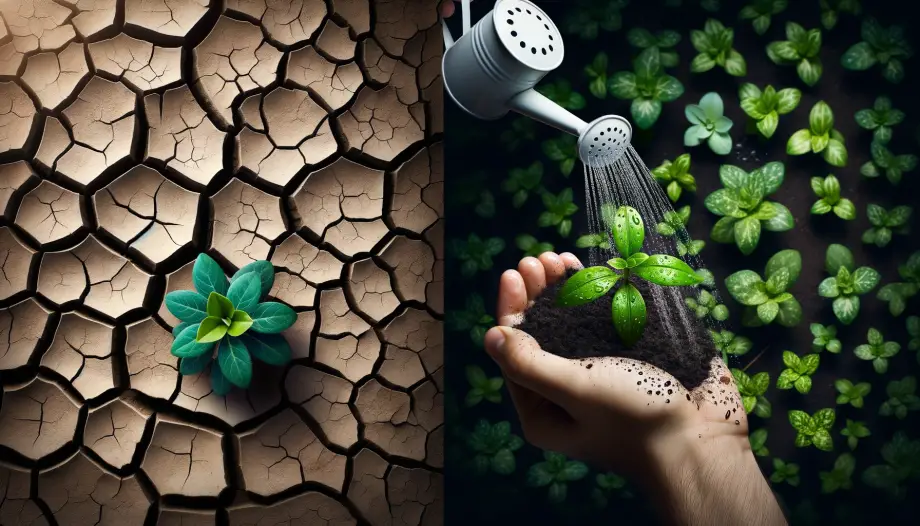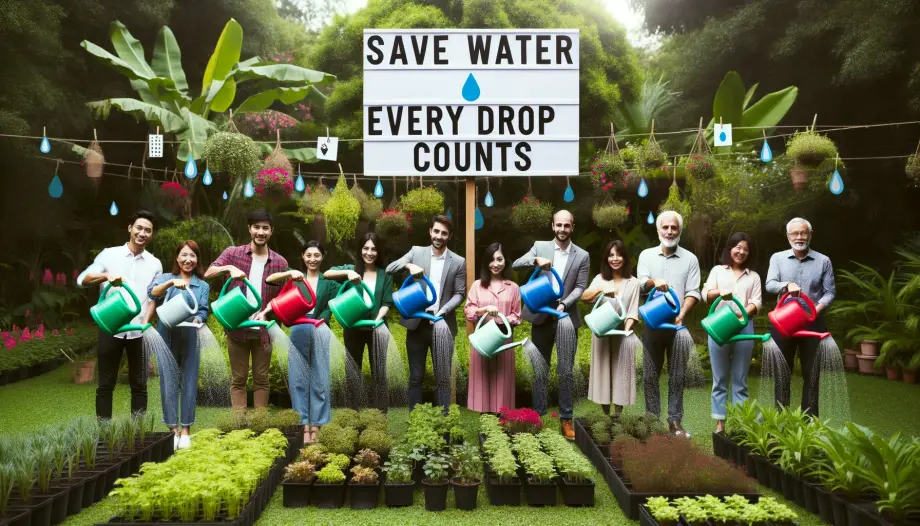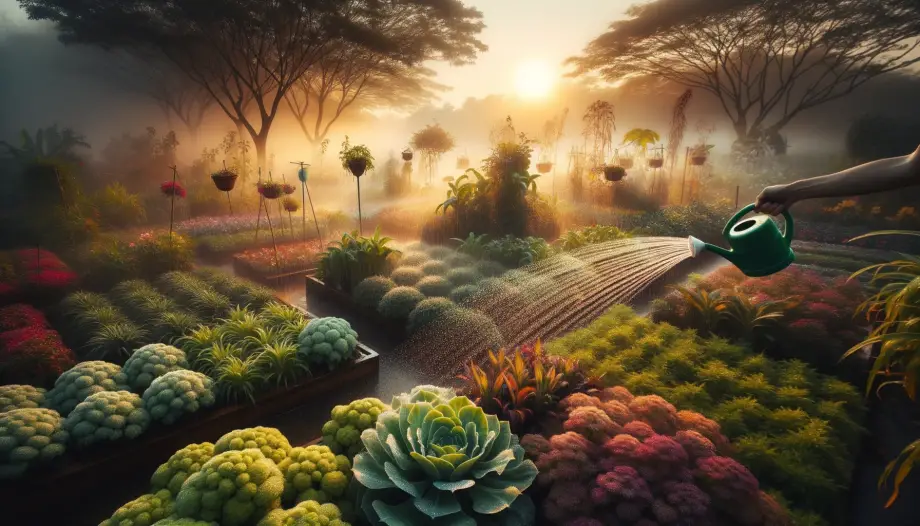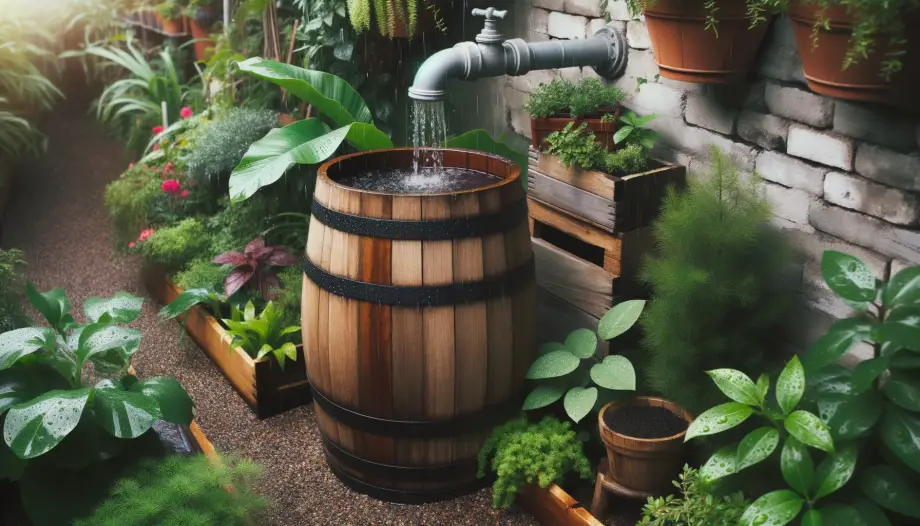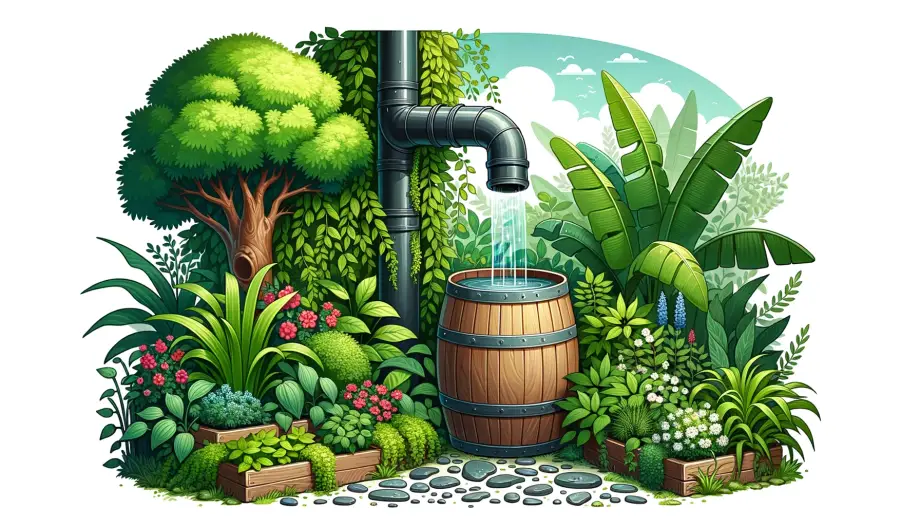
Discover why water conservation is the keystone of sustainable living. Dive into a journey of creating a green future by saving every precious drop.
Water Conservation Key Takeaways:
- Water conservation is the keystone of sustainable living.
- It preserves the essential resource
- Supports agriculture
- Reduces energy usage,
- Promotes ecological balance.
- By saving water, we take a giant leap towards a sustainable, eco-conscious lifestyle, ensuring a harmonious co-existence with nature.
Water Conservation: The Keystone of Sustainable Living
In our quest for a greener future, we often overlook a fundamental truth – water conservation is the keystone of sustainable living.
The simplicity of this action, saving water, unfolds into a ripple of positive changes, nurturing a sustainable lifestyle.
As we delve into the realms of conservation and sustainability in this post, we’ll unravel how each drop saved today is a stride towards a balanced, eco-friendly lifestyle tomorrow.
- Intro: Water is an indispensable part of our lives, and its conservation is a fundamental aspect of sustainable living.
- By adopting water-saving practices, we not only preserve this crucial resource but also step closer to a sustainable and eco-friendly lifestyle.
- In this post, we’ll delve into the myriad ways water conservation serves as the keystone for sustainable living, and how simple practices can make a monumental difference in our quest for a greener future.
The Significance of Water Conservation in Sustainable Living

Water, a precious resource, plays a central role in sustainable living.
The practice of water conservation isn’t just about saving every drop; it’s a crucial step towards creating a balanced eco-friendly lifestyle.
Discover the significance of this practice and how it intertwines with sustainable living.
Water conservation includes all the policies, strategies and activities to sustainably manage the natural resource of fresh water, to protect the hydrosphere, and to meet the current and future human demand (thus avoiding water scarcity) From Wikipedia
How Water Conservation Contributes to Sustainable Living
Embracing water conservation is akin to taking a leap towards sustainable living. This practice not only helps preserve this invaluable resource but also paves the way for an eco-conscious lifestyle. Dive into the myriad ways water conservation and sustainable living are intertwined.
Tangible Steps Towards Water Conservation
The journey towards water conservation is a collective endeavor, beginning at our homes and extending to our communities.
By adopting simple water-saving practices at a personal level and participating in community initiatives, we can significantly contribute to water conservation.
This section explores simple steps to enhance home water efficiency and highlights how local communities are making strides in water conservation.
Home Water Efficiency: Exploring simple steps to reduce water usage at home
Water conservation at home is simpler than one might think. It starts with mindful usage and the adoption of efficient appliances.
Here are some steps to reduce water usage at home:
- Fixing Leaks: A small drip can waste a lot of water over time. Regularly check for leaks in taps, pipes, and toilet tanks.
- Low-flow Fixtures: Install low-flow showerheads and faucets to reduce water usage without compromising on utility.
- Water-Saving Appliances: Opt for appliances with better water efficiency ratings, like high-efficiency washing machines and dishwashers.
- Rainwater Harvesting: Collect rainwater to use for watering plants, cleaning, or even flushing toilets.
- Mindful Water Usage: Be conscious of the water used while doing daily chores, like turning off the tap while brushing teeth or washing dishes efficiently.
Community Initiatives: How local communities are making strides in water conservation
Local communities play a pivotal role in water conservation. Their collective efforts can result in substantial water savings and foster a culture of conservation.
Here’s how communities are making strides:
- Water Education Programs: Conducting awareness campaigns and educational programs to inform residents about the importance of water conservation and how to practice it.
- Community Rainwater Harvesting: Setting up communal rainwater harvesting systems to collect and utilize rainwater.
- Local Water Policies: Implementing local water policies that encourage or require water conservation practices.
- Community Gardens: Establishing community gardens with drought-resistant plants and efficient irrigation systems.
- Water Recycling Initiatives: Promoting water recycling and reuse initiatives within the community, reducing the demand for freshwater.
By engaging in these initiatives, communities can create a significant impact on water conservation, paving the way for a sustainable and eco-friendly lifestyle on a broader scale.
Water Conservation: A Pillar of Sustainable Living
Water conservation transcends the mere act of saving water; it epitomizes a cornerstone of sustainable living.
When we embrace water-wise practices, we are not only fostering a greener present but also laying a robust foundation for a sustainable future.
The ripples of water conservation extend far and wide, imprinting a positive mark on global landscapes.
This section endeavors to unveil the global implications of water conservation and casts a hopeful eye towards a future where water challenges are surmountable through conservation efforts.
Global Implications: The ripple effect of water conservation on a global scale
The act of conserving water has a butterfly effect on a global scale, leading to substantial positive changes.
- Resource Preservation: By conserving water, we are ensuring that this precious resource is available for future generations, preserving the essential life-sustaining resource.
- Ecosystem Balance: Water conservation helps in maintaining the balance of freshwater ecosystems, which are often the first to bear the brunt of water scarcity.
- Climate Change Mitigation: Water conservation can play a role in mitigating climate change by reducing the energy required to pump, heat, and treat water.
- Transboundary Cooperation: Water conservation initiatives can foster cooperation among regions sharing water resources, promoting peace and collaborative sustainable water management.
Future Outlook: Optimism in overcoming water challenges through conservation
Amid the daunting water challenges that loom, there lies a silver lining embodied in conservation efforts.
- Technological Advancements: Innovations in water-saving technologies and wastewater treatment are promising strides toward overcoming water challenges.
- Community Awareness: Increased awareness and community-led water conservation initiatives hold the key to a sustainable water future.
- Policy Reforms: Encouraging policy reforms aimed at promoting water conservation and efficient water management can significantly address water challenges.
- Sustainable Practices: Adopting sustainable water usage practices in agriculture, industries, and households is pivotal in overcoming water scarcity and ensuring a water-secure future.
Water conservation is not just a response to the water crisis; it’s a proactive approach to circumvent the crisis, ensuring a sustainable, resilient world for generations to come.
Through collective efforts in water conservation, a hopeful, sustainable future is within our grasp.
The Interlink Between Water Conservation and Sustainable Living
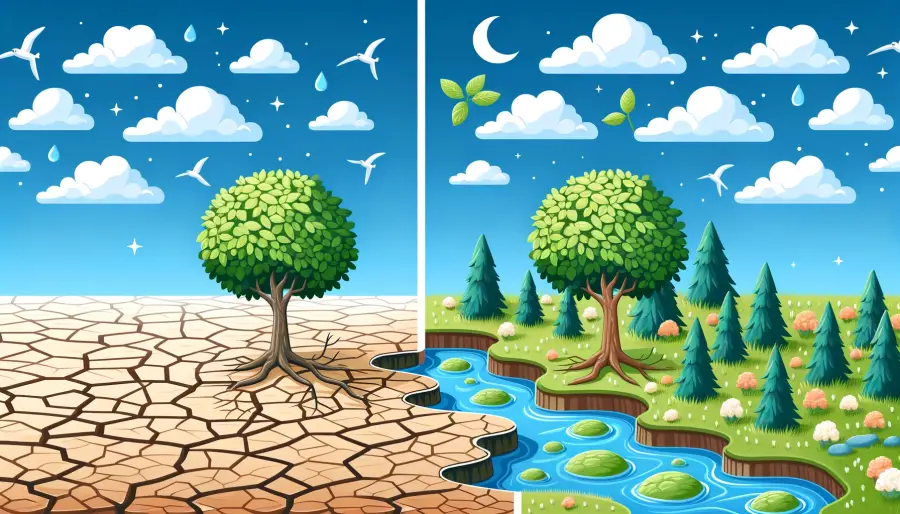
The ripple of conserving water extends beyond merely reducing utility bills; it encapsulates a strong stride toward sustainable living.
The nexus between water conservation and sustainability is not only profound but essentially inseparable.
As we delve into this section, we unravel how the act of conserving water serves as a catalyst propelling us closer to the emblematic goal of living sustainably.
Ecological Balance: Maintaining a delicate balance between human needs and environmental stability
The act of conserving water is synonymous with maintaining a delicate ecological balance.
It ensures that the environmental thresholds are not breached, thereby sustaining the natural habitats and biodiversity.
Water conservation aids in reducing pollution and the degradation of water ecosystems.
Moreover, it alleviates the stress on the existing freshwater resources, ensuring that the ecological processes remain intact and continue to support life in its myriad forms.
Economic Savings: The financial benefits of water conservation
Water conservation is a pocket-friendly endeavor. By reducing water usage, individuals and businesses can significantly lower their utility bills.
Moreover, on a broader scale, water conservation reduces the financial burden on community resources.
It minimizes the costs associated with water treatment, pumping, and the infrastructure required to store and deliver water.
Furthermore, water conservation in agricultural and industrial sectors can lead to cost-effective operations, fostering economic sustainability.
Thus, the economic savings accrued from water conservation are a testament to its role as a cornerstone in the larger framework of sustainable living.
Unveiling the Role of Water Conservation in Sustainable Living
Water conservation is not a trendy buzzword but a necessity for sustainable living. Each drop saved is a stride towards a greener, more sustainable lifestyle.
Uncover the vital role water conservation plays in the realm of sustainable living and how it’s much more than a mere eco-friendly practice.
Ecological Balance: Maintaining a delicate balance between human needs and environmental stability
The act of conserving water is synonymous with maintaining a delicate ecological balance.
It ensures that the environmental thresholds are not breached, thereby sustaining the natural habitats and biodiversity.
Water conservation aids in reducing pollution and the degradation of water ecosystems.
Moreover, it alleviates the stress on the existing freshwater resources, ensuring that the ecological processes remain intact and continue to support life in its myriad forms.
Economic Savings: The financial benefits of water conservation
Water conservation is a pocket-friendly endeavor. By reducing water usage, individuals and businesses can significantly lower their utility bills.
Moreover, on a broader scale, water conservation reduces the financial burden on community resources.
It minimizes the costs associated with water treatment, pumping, and the infrastructure required to store and deliver water.
Furthermore, water conservation in agricultural and industrial sectors can lead to cost-effective operations, fostering economic sustainability.
Thus, the economic savings accrued from water conservation are a testament to its role as a cornerstone in the larger framework of sustainable living.
Water Conservation and Sustainable Living

Water, flowing through our lives, manifests as an indispensable ally in our daily routines, and its conservation emerges as a fundamental pillar of sustainable living.
When we embrace water-saving practices, we are not merely preserving this vital resource; we are stepping closer to a sustainable, eco-friendly lifestyle.
In this insightful venture, we’ll explore the myriad ways in which water conservation serves as the keystone for sustainable living, and how the infusion of simple practices can carve a monumental difference in our pursuit of a greener future.
Policy Framework: The role of governance in promoting water conservation
The scaffolding of effective water conservation rests significantly on the shoulders of robust policy frameworks.
Governance plays a pivotal role in promulgating water conservation by formulating and enforcing policies that promote water-efficient practices.
Regulations that incentivize water-saving technologies, mandate water-efficient appliances, and encourage wastewater recycling are instrumental in promoting water conservation.
Moreover, water pricing and allocation policies can be tailored to reflect the true value of water, thereby promoting its judicious use.
Public Awareness: Fostering a culture of conservation among individuals and communities
Cultivating a culture of conservation is a collective endeavor that begins with enlightening individuals and communities about the essence of water conservation.
Public awareness campaigns, educational programs, and community workshops are vital tools in fostering a conservation-centric ethos.
When individuals are informed about the impact of water conservation, not just on their utility bills but on the broader environmental and socio-economic canvas, a collective consciousness towards water conservation burgeons.
This heightened awareness is a stepping stone towards creating a ripple of conservation practices that resonate through communities, culminating in a substantial impact on water conservation and sustainable living.
The Problem of Freshwater Shortage and Misuse

Our blue planet, with its vast oceans and rivers, might appear to have an abundance of water.
Yet, freshwater the kind we rely on for survival is in perilously short supply.
The escalating global population and its resultant needs have led to a severe freshwater shortage.
This section elucidates the gravity of the freshwater crisis, the human activities exacerbating this issue, and the repercussions of water misuse on urban and agricultural sectors.
Global Freshwater Crisis Overview:
The alarming rate at which freshwater resources are depleting is a red flag for humanity.
Water sources are dwindling due to factors like climate change, pollution, and over-extraction.
The depletion of groundwater, in particular, is concerning as it’s a primary source of freshwater for many regions.
This crisis not only threatens human existence but also the diverse ecosystems reliant on freshwater.
Human-induced Water Misuse:
The misuse of water by humans significantly contributes to the freshwater crisis.
Activities such as over-irrigation, industrial pollution, and reckless disposal of waste into water bodies are notable culprits.
Moreover, the lack of efficient water management systems and public awareness exacerbates the situation.
The negligent attitude towards water conservation reflects poorly on our preparedness to tackle the impending water crisis.
Effects on Urban and Agricultural Sectors:
The repercussion of water misuse transcends beyond environmental degradation, hitting hard on urban and agricultural sectors.
Urban areas face water shortages, impacting households, industries, and municipal services.
On the flip side, agriculture, which consumes a significant portion of freshwater, suffers from reduced yields due to water scarcity.
Moreover, the competition for water between these sectors can lead to conflicts, hindering sustainable development.
The ripple effect of water misuse underscores the urgency to adopt water-saving measures and efficient management practices to ensure a balanced and sustainable utilization of this invaluable resource.
Health and Sanitation
The ripple effect of water scarcity stretches far and wide, with health and sanitation being at the forefront.
Lack of adequate water supply threatens not only personal hygiene but also community health.
This section aims to shed light on the detrimental effects of water scarcity and underline the importance of clean water in disease prevention, showcasing the intrinsic link between water conservation and public health.
Detrimental Effects of Water Scarcity:
Water scarcity poses a significant threat to health and sanitation.
Inadequate water supply hampers personal hygiene, leading to the spread of infectious diseases.
Furthermore, water scarcity compromises the functionality of healthcare facilities, making it challenging to maintain cleanliness and carry out medical procedures safely.
Additionally, the lack of water exacerbates the situation in regions already burdened with waterborne diseases, creating a vicious cycle of illness and water scarcity.
Importance of Clean Water:
Clean water is a linchpin for disease prevention. It is instrumental in breaking the cycle of infection and disease spread.
Access to clean water drastically reduces the incidences of waterborne diseases such as cholera, dysentery, and typhoid.
Furthermore, clean water is crucial for food preparation, personal hygiene, and sanitation services, which are fundamental for maintaining a healthy community.
The availability of clean water also ensures that healthcare facilities can operate effectively, thus playing a vital role in disease prevention and promoting overall community health.
Through water conservation, we can ensure a steady supply of clean water, fostering healthier and more sustainable living conditions.
Food Production and Agriculture
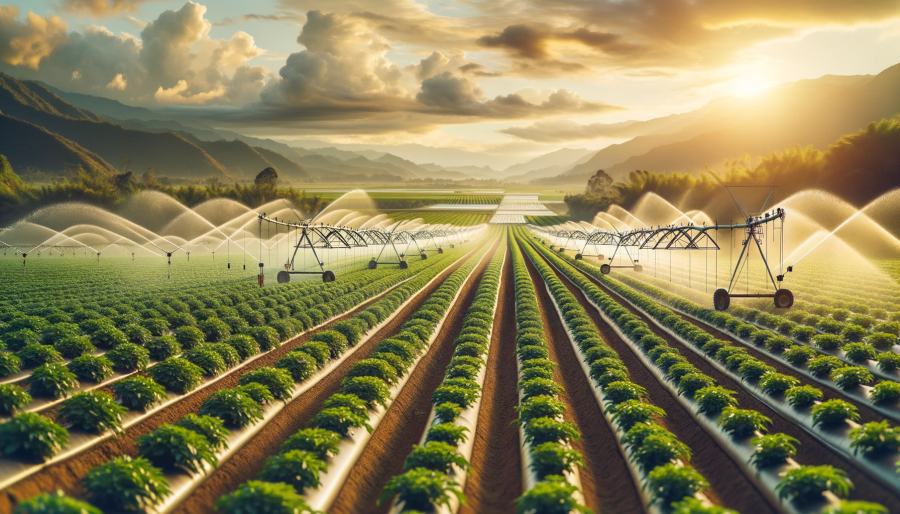
The symbiotic relationship between water and agriculture is undeniably crucial for food production.
It’s a lifeline for crops, livestock, and ultimately, us humans. However, the dark cloud of water scarcity looms large, threatening food security and the livelihoods of communities.
This section explores the indispensable role of water in agriculture and the repercussions water scarcity poses to both food production and broader societal frameworks.
Water’s Role in Agriculture:
Water is the lifeline of agriculture, playing a pivotal role in ensuring food security.
It’s indispensable for the growth of crops, maintenance of livestock, and overall agricultural productivity.
Besides being a medium for growth, water is crucial for preparing the land, irrigating crops, and even protecting plants from frost.
The quality and availability of water directly impact the yield and, consequently, the viability of the agricultural sector.
Repercussions of Water Scarcity:
Water scarcity casts a long shadow on food production, thereby affecting communities and food security.
When water is scarce, crops suffer, livestock is threatened, and food production costs soar.
This creates a domino effect, leading to food shortages, escalating prices, and ultimately, a threat to food security.
The ripple effects extend to the livelihoods of farmers and the economic stability of regions dependent on agriculture.
Moreover, water scarcity can exacerbate rural-urban migration, adding pressure to already strained urban areas.
It’s a stark reminder of the urgent need for sustainable water management practices to ensure food security and agricultural sustainability.
Environmental and Socio-economic Implications
Water scarcity doesn’t just halt at affecting human lives; it reverberates through ecosystems and economies, creating a chain of unfavorable consequences.
The essence of sustainable living is to maintain a harmonious balance between human activities and the environment, which is severely disrupted by water scarcity.
This section elaborates on the environmental ramifications and the economic adversities brought about by water shortages, thereby emphasizing the importance of water conservation for a balanced and sustainable future.
Environmental Ramifications of Water Scarcity:
Water scarcity triggers a domino effect within ecosystems, leading to an imbalance that affects both flora and fauna.
Lack of water causes habitat degradation and loss of biodiversity as organisms struggle to survive in altered habitats.
Furthermore, water scarcity exacerbates land degradation and desertification, making the land unproductive.
This imbalance not only diminishes the natural beauty and health of ecosystems but also disrupts ecological functions, like nutrient cycling and natural purification processes, that are pivotal for maintaining the overall environmental balance.
Economic Adversities:
The economic repercussions of water shortages are significant and far-reaching.
Water scarcity increases the cost of water acquisition for both domestic and industrial purposes.
In agricultural regions, water scarcity translates to reduced yields and higher food prices.
Industries reliant on water face operational challenges, and in severe cases, may need to halt production, leading to financial losses and job cuts.
Moreover, the need to address water scarcity and its effects often requires significant financial investments in water infrastructure, technology, and conservation programs.
These economic adversities underscore the necessity for proactive water management strategies to foster economic stability and growth in a sustainable manner.
Water Conservation FAQs
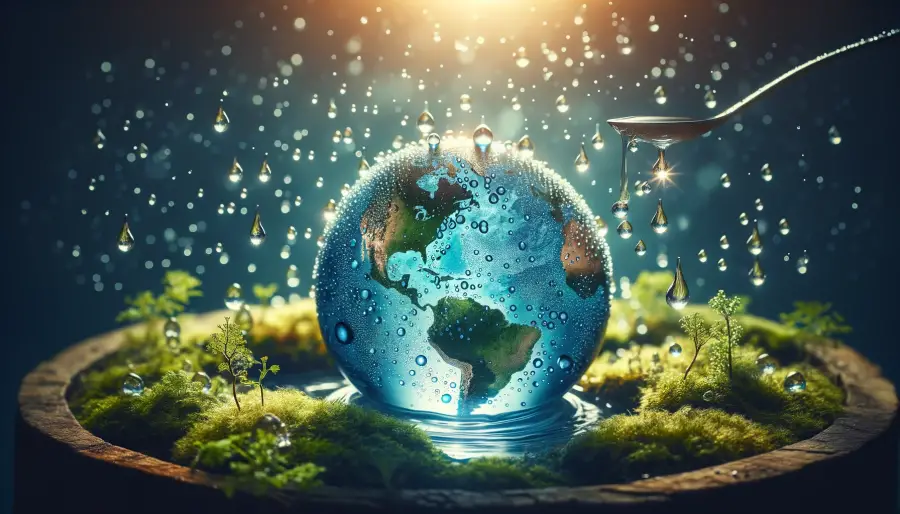
Water conservation is a topic that resonates with every individual, given its direct impact on our lives and the environment.
It’s natural to have questions about how one can contribute to water conservation and understand its broader significance.
In this section, we address some common queries regarding water conservation and its pivotal role in sustainable living.
Q: Why is water conservation important?
A: Water conservation is imperative for numerous reasons. It plays a significant role in promoting health by ensuring the availability of clean water, which is crucial for sanitation and disease prevention.
In the agricultural sector, water conservation supports food production by aiding in the efficient use of water for irrigation.
Additionally, conserving water helps preserve the environment by preventing the loss of biodiversity, reducing the strain on freshwater ecosystems, and combating the challenges posed by water scarcity.
Q: How does water scarcity affect the environment?
A: Water scarcity has a profound impact on the environment. It leads to biodiversity loss as the habitats of various organisms get altered or destroyed.
Deforestation often occurs when regions lose their water sources, leading to soil erosion and further loss of biodiversity.
Moreover, water scarcity contributes to desertification, turning previously fertile lands into unproductive deserts, which further exacerbates the cycle of environmental degradation.
Q: What are some simple water conservation methods?
A: There are numerous simple methods to conserve water. Taking shorter showers, fixing leaky faucets and pipes, and utilizing efficient irrigation systems in gardens and farms can significantly reduce water wastage.
Other methods include collecting rainwater, choosing drought-resistant plants for landscaping, and being mindful of water usage in daily activities like washing dishes or clothes.
Q: How does water conservation contribute to sustainable living?
A: Water conservation is a cornerstone of sustainable living. By reducing water wastage, we can lessen the depletion of natural resources, thereby promoting eco-friendly practices.
Water conservation supports sustainable agriculture by enabling efficient water use, which in turn ensures food security.
Moreover, by adopting water-saving practices, individuals and communities can contribute to building a sustainable and resilient society that is better equipped to face environmental challenges.
Conclusion
As we navigated through the multifaceted realm of water conservation and its indispensable role in sustainable living, a clear narrative emerged.
The ripple effect of our water usage patterns extends far beyond the immediate vicinity, touching lives, ecosystems, and economies across the globe.
In this conclusion, we recapitulate the vital points discussed and encourage a proactive stance towards water conservation for a sustainable and eco-friendly lifestyle.
Recapitulation:
Water is not just a basic necessity; it’s the lifeblood of our planet, essential for the survival and thriving of ecosystems, agriculture, and human communities.
The alarming rate of freshwater depletion, exacerbated by human-induced misuse, poses a significant threat to health, sanitation, food security, and economic stability.
The environmental and socio-economic implications of water scarcity underline the urgency of adopting sustainable water management practices.
Encouragement:
The journey towards water conservation begins with individual actions.
Simple measures like fixing leaks, reducing shower time, and implementing efficient irrigation systems can collectively make a significant impact.
Embracing water conservation is a step towards sustainable living, fostering a culture of responsibility and mindfulness towards our environment.
Together, let’s make water conservation a priority, paving the way for a sustainable, eco-friendly lifestyle that harmonizes with nature and ensures a balanced and prosperous future for all.

